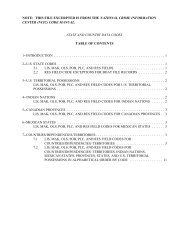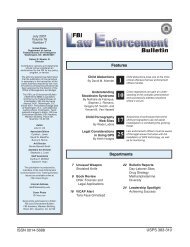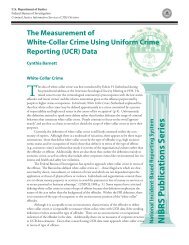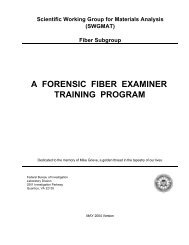F B I Law Enforcement Bulletin - June 2003 Issue
F B I Law Enforcement Bulletin - June 2003 Issue
F B I Law Enforcement Bulletin - June 2003 Issue
Create successful ePaper yourself
Turn your PDF publications into a flip-book with our unique Google optimized e-Paper software.
maintaining a healthy balance in<br />
meeting reasonable responsibilities<br />
to the job, to themselves, and to<br />
their families.<br />
The Old Covenant<br />
Some in public safety view the<br />
aphorism “work ethic,” surely a curious<br />
juxtaposition of words, as representative<br />
of the old covenant.<br />
This paradigm celebrates the job<br />
above all else. Team players count<br />
the most; the job comes first; no<br />
sacrifice is too great.<br />
Police supervisors, socialized<br />
within this old covenant, operate in<br />
a world that expects human carnage<br />
as a by-product. Work ethic represents<br />
a “code” for doing whatever it<br />
takes, and, perhaps, the only ethic<br />
involved is the certainty that the job<br />
must be done. Lost in this reasoning<br />
is the moral responsibility that<br />
supervisors hold for the fair and<br />
ethical treatment of officers and<br />
their families. As a practical matter,<br />
getting the job done through people<br />
Mr. Solan, a retired law enforcement<br />
officer, currently is an adjunct faculty<br />
member at Columbia College in<br />
Syracuse, New York.<br />
14 / FBI <strong>Law</strong> <strong>Enforcement</strong> <strong>Bulletin</strong><br />
requires consideration of, and for,<br />
those very people.<br />
The Price of Work Addiction<br />
Perhaps, Chief Smith represents<br />
an extreme example of the<br />
dangers inherent in the workaddicted<br />
lifestyle. However, literature<br />
on work addiction asserts that<br />
work constitutes the drug of choice<br />
for some 30 percent of the population,<br />
for whom working is so vital<br />
to their emotional well-being that<br />
in fact, they have become addicted<br />
to it. 1 While the actual mortality<br />
rate for work addiction may be<br />
low, the social lethality of this behavior<br />
proves overwhelming. These<br />
unfortunate individuals are predisposed<br />
to involve themselves—and<br />
their families—in a life not unlike<br />
that of Chief Smith. Clearly, work<br />
addicts (or workaholics, the more<br />
common descriptor) cannot assess<br />
what is important in healthy<br />
lifestyle choices and, thus, experience<br />
a diminished quality of life.<br />
Dr. Casey teaches counseling<br />
and psychological services at<br />
the State University of New York<br />
at Oswego.<br />
Regrettably, they do not suffer<br />
alone. They unwittingly share this<br />
pain with their families and colleagues<br />
alike.<br />
Workaholics are married to<br />
their work. Their vows to love and<br />
honor their spouses above all “others”<br />
no longer holds meaning or<br />
possibility. No spouse and no family<br />
can compete with this allconsuming<br />
obsession.<br />
Workaholics themselves are a<br />
key contributor to the unhealthy<br />
family patterns resulting from work<br />
addiction for a number of reasons.<br />
First, they may have grown up in a<br />
dysfunctional family system where<br />
role models taught unhealthy patterns<br />
of relating to others. Research<br />
indicates that the family of origin<br />
contributes greatly to the development<br />
of the workaholic, and the<br />
roots of the workaholic’s perfectionism<br />
often lie in childhood experiences.<br />
2 In these dysfunctional<br />
homes, families reward children for<br />
good performance, not for who they<br />
are. They give praise and conditional<br />
love only whenever children<br />
perform a certain way or meet certain<br />
high expectations. In adulthood,<br />
this same need for perfection<br />
is the basis for the obsession for<br />
work—everything must be done<br />
properly and always at a very high<br />
level of competence and perfection.<br />
Second, the need for workaholics<br />
to feel dominant and “in<br />
control” may make them less able<br />
to relate to peers. They may interact<br />
more easily with older and<br />
younger people or those of a lower<br />
status or socioeconomic level than<br />
themselves. This need for continually<br />
being in control of themselves<br />
and in charge creates tension<br />
in family relationships. The one














